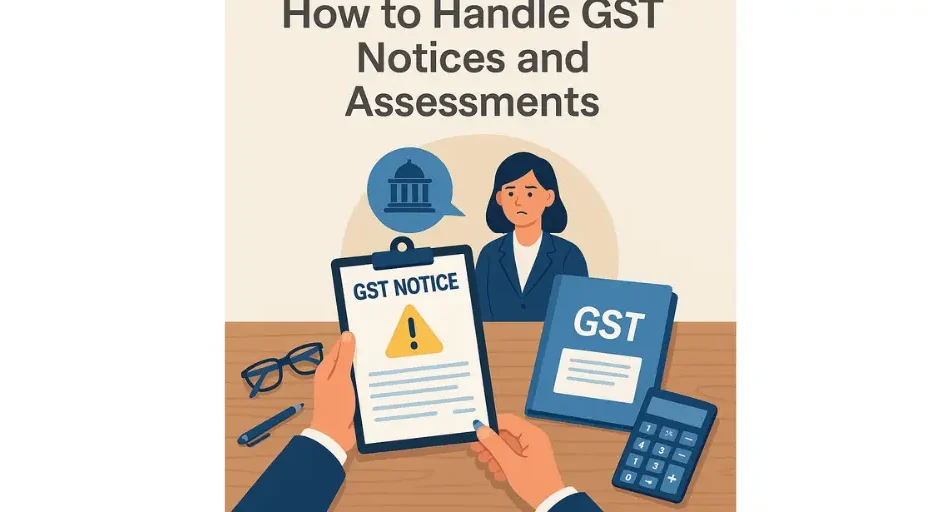How to Handle GST Notices and Assessments
Goods and Services Tax (GST) is a comprehensive tax system implemented to streamline indirect taxation in India. However, with strict compliance requirements, many businesses occasionally receive GST notices from tax authorities. Whether it’s due to mismatched returns, suspected evasion, or late filings, receiving a GST notice can cause concern. But don’t panic—understanding the types of notices and how to respond can help you handle assessments smoothly and stay compliant.
In this blog, we’ll break down what GST notices are, the types issued, common reasons for them, and how to respond effectively.
What Are GST Notices?
GST notices are formal communications issued by GST authorities to taxpayers, typically asking for clarifications, documents, or action related to discrepancies or compliance issues. These notices are part of the assessment and enforcement process under the GST law.
Ignoring a GST notice can lead to penalties, interest, or even audits and legal action. Therefore, it’s crucial to understand the type of notice you’ve received and respond accordingly.
Types of GST Notices
Here are some of the common types of GST notices:
1. Notice for Non-Filing of Returns (GSTR-3A)
Issued when a taxpayer fails to file returns on time. The notice demands compliance within 15 days.
2. Scrutiny Notice (Section 61)
This notice is sent if the officer finds discrepancies in the filed returns during scrutiny. It asks for clarifications and explanations.
3. Show Cause Notice (SCN – Section 73 & 74)
Issued when the department suspects tax short-payment, non-payment, or fraudulent availing of input tax credit. The taxpayer is asked to show cause why tax should not be recovered.
4. Audit Notices (Section 65/66)
A formal intimation of a GST audit by tax authorities or a special audit by a chartered accountant or cost accountant.
5. Assessment Notices (Section 62 – Best Judgment Assessment)
These are issued when returns are not filed even after a notice under Section 46. Tax liability is assessed based on available information.
6. Notice for Mismatch in ITC (Input Tax Credit)
Issued when there is a mismatch in ITC claimed and the supplier’s GSTR-1 data.
Each of these GST notices serves a specific purpose, and knowing which type you’ve received is key to handling it properly.
Common Reasons for Receiving GST Notices
Several issues can trigger GST notices, such as:
Delay or non-filing of GST returns (GSTR-1, GSTR-3B)
Mismatch in outward/inward supplies
Incorrect input tax credit claims
Underreporting of turnover
Payment defaults
Wrong classification of goods/services
A well-maintained compliance record can significantly reduce the chances of receiving such notices.
Steps to Handle GST Notices
Receiving a GST notice doesn’t automatically mean you’re in trouble. The key lies in your response. Here are the essential steps:
1. Read the Notice Carefully
Check the notice type, section under which it has been issued, and the deadline to respond. Most GST notices come with a stipulated timeline that must be strictly followed.
2. Assess the Reason for the Notice
Understand why the notice was issued. Was it due to a genuine error, system glitch, or non-compliance? Take help from your GST consultant or accountant if needed.
3. Gather Relevant Documents
Collect all records, invoices, returns, or communication needed to support your response. Accurate documentation is key to resolving GST notices quickly.
4. File a Timely and Accurate Response
Your reply should clearly address the concerns raised in the notice. Use the GST portal to upload the necessary responses and documentation.
5. Correct the Errors (if applicable)
If the notice was issued due to a genuine mistake, rectify the error in your returns (if permitted), pay the required tax, and inform the department accordingly.
6. Seek Professional Help
Complex cases, especially show cause notices or audit notices, require expert intervention. Consult a GST practitioner or legal advisor to ensure you’re compliant and protected.
How to Respond on the GST Portal
Here’s how you can respond to GST notices online:
Login to the GST portal (www.gst.gov.in)
Go to “User Services” > “View Additional Notices and Orders”
Choose the notice to be responded to
Download the notice and prepare your reply
Upload the necessary documents and submit your response
Keep the acknowledgment for records
Always keep digital and hard copies of all correspondence for future reference.
Best Practices to Avoid GST Notices
While it’s not always possible to avoid GST notices, you can significantly reduce the risk by:
Filing returns on time
Reconciling GSTR-2B with books of accounts regularly
Maintaining proper documentation
Staying updated with GST law changes
Avoiding misclassification of goods or services
Ensuring vendor compliance (as ITC depends on their returns)
Being proactive in your compliance strategy is the best way to avoid penalties and audits.
Conclusion
Dealing with GST notices is a part of the tax compliance journey for many businesses in India. By understanding the types of notices, reasons behind them, and the correct way to respond, you can manage these situations with confidence.
Remember, timely action, accurate documentation, and professional advice are your best defenses against complications arising from GST notices. Treat each notice as an opportunity to correct errors and strengthen your business’s compliance posture.
Staying GST-compliant not only prevents GST notices but also builds credibility for your business in the long run.
Our GST Services

All E-commerce Tax services
E-commerce tax services help online sellers navigate GST registration, compliance, return filing, TCS management, tax planning, and audits, ensuring efficient tax management and legal compliance.

GST Filing
GST filing is the process of submitting tax returns to the government, detailing sales, purchases, and taxes paid or collected, ensuring compliance with GST laws.

GST Registration
GST registration is the process where businesses obtain a GSTIN from the government, allowing them to collect taxes, claim input tax credits, and comply with GST laws.



